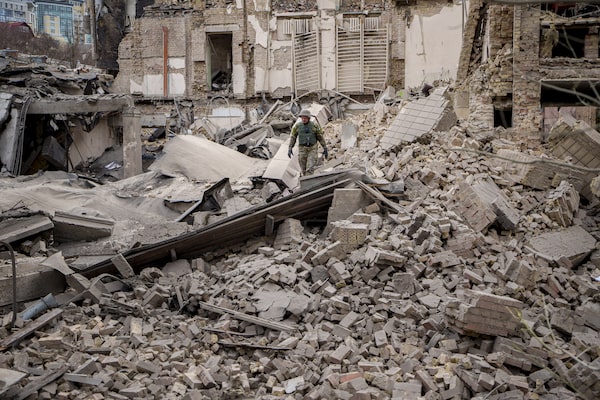
A Ukrainian serviceman inspects the damage to a building at the Pecherskyi district, after a Russian air attack in Kyiv on March 25.Vadim Ghirda/The Associated Press
A military unit of foreign fighters in the Ukrainian war had taken up covert missions against Russia when its Canadian commander was killed, says a researcher who studies war in the former Soviet Union.
Jean-Francois Ratelle, who led the Norman Brigade under the nom de guerre Hrulf, was one of two Canadians to die within the past month fighting for Ukraine.
An international studies professor at the University of Ottawa, also called Jean-Francois Ratelle, said the Norman Brigade appears to have shifted from occupying defence roles – holding battle lines – to activities outside the front lines. Ratelle, who studies foreign fighters, is not related to the deceased soldier of the same name.
“From what we can tell, a lot more covert activities, things that were behind enemy lines, a lot less of holding the lines and the typical infantry battles in the cities,” Ratelle said in an interview Monday about the Norman Brigade’s changing duties in the war.
“It seems that they turned into an asset for the Ukrainian military intelligence.”
Global Affairs Canada said it is aware of two Canadians who recently died while fighting for Ukraine, bringing the total number killed to 11 since Russia invaded in February 2022.
Another Quebecker, Alain Derasp, 49, died in Ukraine on Feb. 27, an obituary said, describing him as a veteran of the Canadian Forces Royal 22nd Regiment and a father of four.
Derasp had been providing first aid training to soldiers in Ukraine and died after contracting an illness near the front lines, according to a military source who asked not to be identified because they were not authorized to speak to the media.
Luc Fortier, who served with Derasp in the Royal 22nd Regiment – also known as the Van Doos – remembered him as cheerful, “but above all very dedicated.”
The infantry is a brotherhood, Fortier said, adding that the sudden loss of Derasp is painful for the soldiers he served with.
Born in Campbellton, N.B., Derasp joined the Canadian Forces in 1992. During his 26-year career, he was part of a United Nations peacekeeping mission and three NATO missions, all in the former Yugoslavia, as well as two missions in Afghanistan.
A warrant officer at the time of his retirement, Derasp lived in Chicoutimi, Que.
Ratelle, who was from was from Joliette, Que., was killed in combat, said a Ukrainian friend, Anna Filippova. In a written message, Filippova said she met him shortly after he arrived in Ukraine in March 2022.
“He was a true warrior, an absolutely unbreakable leader and warrior,” she said. “He had backbone, and principles and he fearlessly pushed forward to the goal no matter what.”
The Department of National Defence said it has records of someone named Jean-Francois Ratelle who served as an artilleryman for three years. A friend said he had later joined the French Foreign Legion, and in pictures posted on social media after his death, he is seen wearing the uniform of the famed French military corps. The French military did not respond to a request for comment.
Chris Ecklund, a Hamilton businessman and philanthropist who has helped Canadians travel to Ukraine to fight – and who has spoken with Ratelle – described him as a dedicated warrior.
“He was following the calling like a lot of other men and women from Canada and all over the world,” Ecklund said in an interview. “He believed in the cause and he was basically trying to help out.”
Professor Ratelle said that foreign fighters have played an auxiliary role in the conflict, and while they have participated in major battles, they’re often used to hold battle lines, for cross-border raids and as decoys ahead of counteroffensives by Ukrainian troops.
The Norman Brigade was formed early in the war, Ratelle said, adding that some members soon left amid internal conflict about the unit’s role. While the unit has raised money online, using social media to promote itself, it became much more covert a few months into the war, he said. Russian propaganda has claimed there is a far-right element to the unit, but Ratelle said he hasn’t seen proof of that.
The deaths of the two Canadians were originally reported by the Russian government in social media posts that included photos of the men and other personal details. In a post on the X platform, formerly known as Twitter, the Russian embassy in South Africa described both men as “mercenaries” and said Ratelle was killed by a drone strike.